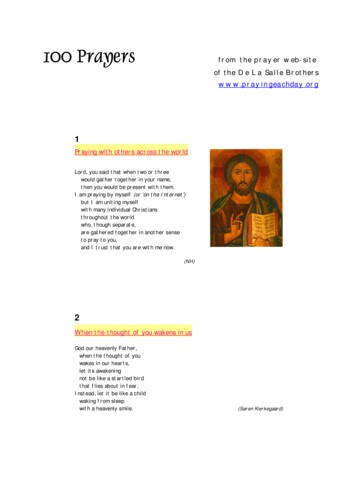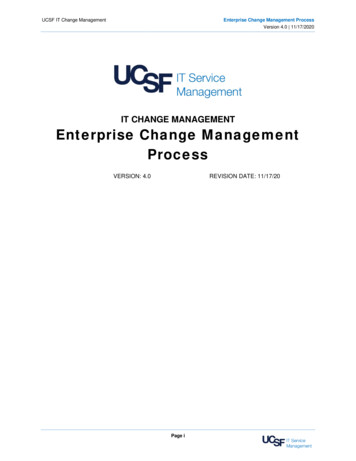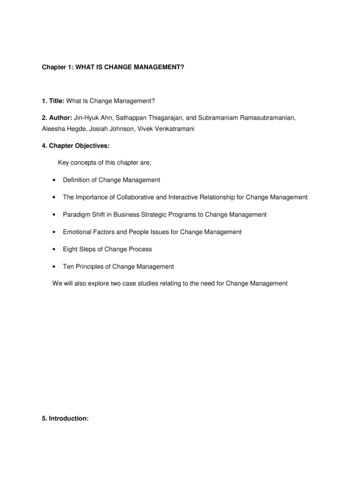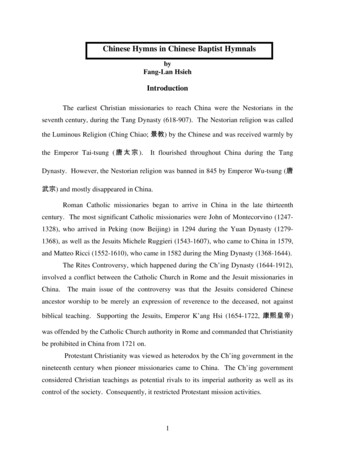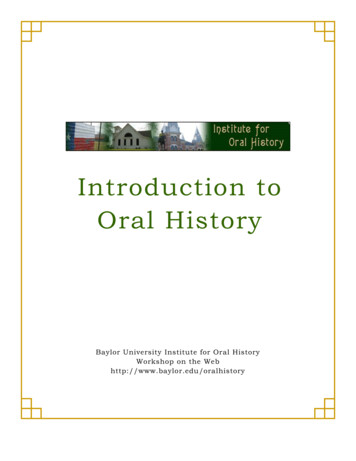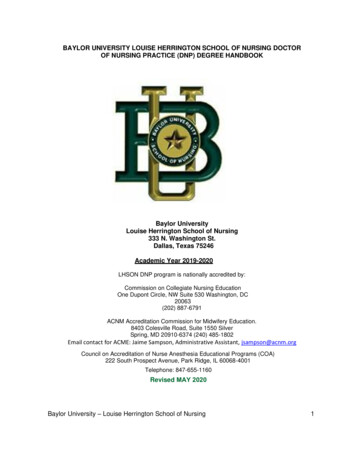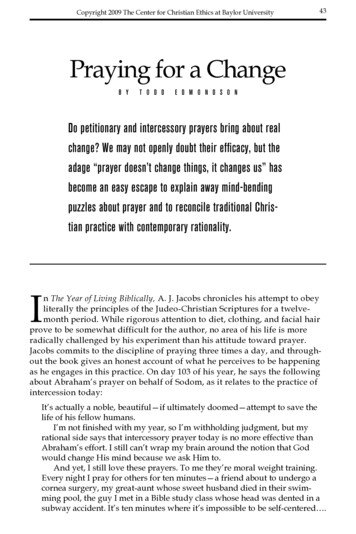
Transcription
Copyright 2009 The Center for Christian Ethics at Baylor University43Praying for a ChangeB yT o d dE d m o n d s o nDo petitionary and intercessory prayers bring about realchange? We may not openly doubt their efficacy, but theadage “prayer doesn’t change things, it changes us” hasbecome an easy escape to explain away mind-bendingpuzzles about prayer and to reconcile traditional Christian practice with contemporary rationality.In The Year of Living Biblically, A. J. Jacobs chronicles his attempt to obeyliterally the principles of the Judeo-Christian Scriptures for a twelvemonth period. While rigorous attention to diet, clothing, and facial hairprove to be somewhat difficult for the author, no area of his life is moreradically challenged by his experiment than his attitude toward prayer.Jacobs commits to the discipline of praying three times a day, and throughout the book gives an honest account of what he perceives to be happeningas he engages in this practice. On day 103 of his year, he says the followingabout Abraham’s prayer on behalf of Sodom, as it relates to the practice ofintercession today:It’s actually a noble, beautiful—if ultimately doomed—attempt to save thelife of his fellow humans.I’m not finished with my year, so I’m withholding judgment, but myrational side says that intercessory prayer today is no more effective thanAbraham’s effort. I still can’t wrap my brain around the notion that Godwould change His mind because we ask Him to.And yet, I still love these prayers. To me they’re moral weight training.Every night I pray for others for ten minutes—a friend about to undergo acornea surgery, my great-aunt whose sweet husband died in their swimming pool, the guy I met in a Bible study class whose head was dented in asubway accident. It’s ten minutes where it’s impossible to be self-centered .
44PrayerThe Bible says not to boast, so I’m not going to say that I’ve turned intoAlbert Schweitzer or Angelina Jolie. But I do feel myself becoming a slightlymore compassionate person.1A pragmatic, psychological, even therapeutic approach to the practice ofintercession is what readers might expect of a writer approaching the JudeoChristian tradition from within the mainstream of Western culture. Whatmay be more alarming is the inescapable reality that in just three months, aself-professed, lifelong agnostic like Jacobs has arrived at a perspective onprayer that is not markedly different from that held by many longtimeChristians. We have an enormous amount of trouble coming to terms withhow petitionary and intercessory prayers might bring about real change. Wemay not openly admit to skepticism about the efficacy of prayer, but theadage “prayer doesn’t change things, it changes us” has become an easyescape to explain away some of the mind-bending obstacles to our understanding of prayer and to reconcile traditional Christian practice withcontemporary rationality.When we think about the place that prayer has occupied in the Christianimagination for two millennia, however, and especially when we open thepages of Scripture, we cannot help but conclude that such a perspective,however neat and tidy it might be, is profoundly unsatisfying and contradictory to what the Church has long held to be true. The story of Abraham’spleading for Sodom is not only a story about Abraham’s compassion, butalso about God’s willingness to listen to his servant and take his requestseriously. On reading the biblical accounts of Hannah praying fervently fora son (1 Samuel 1) or of Samson pleading with God that his strength mightbe returned (Judges 16), we are drawn by these stories to affirm not just thatthese characters were somehow changed, but that events actually happenedin the world as a result of their petitions.New Testament perspectives on prayer are no less challenging to ourmodern sensibilities. Jesus’ prayer for his followers, “I ask you to protectthem from the evil one” (John 17:15b), and Peter’s prayer over the lifelessbody of Tabitha (Acts 9:36-42) were intended to have real consequences,external to the intercessors’ psyches. Later, Paul urges the Ephesians to taketheir stand against the wiles of the devil, encouraging them to “Pray in theSpirit at all times in every prayer and supplication” (Ephesians 6:18a). Thisexhortation is presumably designed not just to make them feel better aboutthe struggle in which they are engaged, but to help them win that struggle.For the heroes of faith who populate the pages of Scripture, prayer wasneither a therapeutic method of self-realization nor an arcane superstitionuseful only for propping up the traditions of the past. It was solid andreal—perhaps the most solid, most real thing that they knew. So when theauthor of James encourages his readers to be steadfast in prayer because“The prayer of the righteous is powerful and effective” (James 5:16), the
Praying for a Change45effects he is talking about are not merely inward stirrings of the soul, butrather what we might call the “real-world” effects of prayer.Once we decide to abandon the notion that prayer only changes us infavor of a more radical, robust, and biblical view of prayer, how do we bearwitness through our words and deeds to the power of prayer? How do wekeep this practice at the center of the Christian life, even in the midst of aculture that is defined by its skepticism toward what it does not understand? Addressing these questions will not be easy, for after thousands ofyears of faithful practice and reflection, prayer is still very much a mysteryto us. Explaining away the mystery would be impossible, and probablyundesirable. But we should pursue some understanding of how we believeprayer works. To do so, it may be necessary for us to reconsider how wecustomarily think about prayer and to recover perspectives that have beenlost over the years.How Prayer affects GodTo embrace prayer as a force for change, we must stop thinking of it asjust a human action. For when we envision prayer solely as something wedo, as a work of human agency, it is almost impossible not to see it as aritual designed for our benefit, as an incantation in which only the mostsuperstitious or simple-minded people believe. Instead, it is helpful to reenvision prayer as a relationship involving God, the world God has created,and the Church. In this way it becomes possible to see prayer as neithertherapy nor superstition,but as a very powerful process through which Godaccomplishes his purposesand transforms reality.The profound difficultythat looms over and shapesany serious discussion onprayer is the same one thatA. J. Jacobs confronted—whether “God wouldchange his mind justbecause we ask him to.”It is imperative that wewrestle with the notion ofhow prayer affects God, but we must proceed with caution. We want toavoid what C. S. Lewis calls an “agent-patient” relationship, in which Godis the patient and our prayers act to manipulate or otherwise coerce God’swork.2 At the same time we want to steer clear of the rationalistic extremethat posits an indifferent God who is not in any way moved by the petitionsor intercessions we lay at the altar of prayer, or a system in which humanOnce we abandon the notion that prayer onlychanges us in favor of a more radical,robust, and biblical view, how do we bearwitness to the power of prayer, especially ina culture defined by its skepticism towardwhat it does not understand?
46Prayerreliance upon divine intervention, or even divine concern, is a bit of outmoded naivety.Within the pages of Scripture we encounter a certain level of tension onthe issue of how the prayers of men and women might affect God. This isprobably not a surprise. On the one hand, there is Baalam’s second oracle,which states “God is not a human being, that he should lie, or a mortal, thathe should change his mind” (Numbers 23:19). Or consider Samuel’s rebuketo a disobedient King Saul: “Moreover the Glory of Israel [God] will notrecant or change his mind; for he is not a mortal, that he should change hismind” (1 Samuel 15:29). Even as Saul seeks to win back God’s favor, God’sresolve to reject the king still stands. This doctrine of divine immovability ischallenged, however, by the story of King Hezekiah’s illness. On receivingthe news that he will soon die, Hezekiah prays to the Lord, and God provides a direct answer within moments through the prophet Isaiah: “I haveheard your prayer. I have seen your tears; indeed, I will heal you” (2 Kings20:5). In this story, as in others scattered throughout the Bible, we encountera God who is not inattentive to the prayers of those he loves, but ratherhears and responds when his children cry out to him.Much of Jesus’ teaching on prayer illustrates God’s willingness not onlyto listen to the intercessions of his people, but to answer them as well. In theSermon on the Mount when he tells us to ask, seek, and knock, we arepromised that these actions will have real results (Matthew 7:7-8). WhenJesus compares God to a parent willing to give good gifts to his children(Matthew 7:9-11), or contrasts God with an unjust judge who respondsbegrudgingly to a widow’s persistent request (Luke 18:1-8), he wants us tounderstand that God is not indifferent to our requests. The God of Jesus’teaching does not strike us as impassible, at least not in the sense in whichimpassibility is commonly understood.Certainly we do not change God with our prayers: the nature, character,and promises of God remain steadfast and eternal. However, if we seeprayer not just as something we are doing, but instead pause to considerhow the Triune God is involved in our prayers—the Son at the right hand ofGod constantly making intercession for us (Romans 8:34), the Spirit virtually praying through us “with sighs too deep for words” (Romans 8:26)—itwould seem remarkable if God the Father, by virtue of his eternal nature,foreknowledge, or providence, were somehow excluded from the process.Why should we imagine that God would be unmoved, not only by theprayers of his people, but also by the constant intercession of the Son at hisright hand and the Spirit moving within his Church?Even as it has striven to affirm the doctrines of eternal providence andthe unwavering nature of God, the Church has also vigorously defended itsconviction that God does respond to the prayers of the faithful, in accordance with his nature and with his promises to do so. As Augustine says,“Prayers are useful in obtaining these favors which he foresaw he would
Praying for a Change47bestow on those who should pray for them.”3 To say that God answersprayer, then, or even to say that God does specific things as a result of ourprayers, is not to question God’s foreknowledge, restrict God’s freedom, orplace God at the mercy of our manipulation. It is rather to say that God actsas God has promised to act—that he will hear the prayers of his people andwill bestow favor upon those who ask. John Calvin, in the same manner,exhorts his readers not to use God’s foreknowledge or providence as anexcuse for neglecting prayer: “Both are true: ‘that the keeper of Israel neither slumbers nor sleeps’ and yet that he is inactive, as if forgetting us,when he sees us idle and mute.”4 Prayer, therefore, does not coerce God, butrather creates space for him to act in our lives in a manner according withhis purposes.Kelly S. Johnson helpfully compares the practices of intercessory andpetitionary prayer to requesting an encore after a popular music performance:At the end of the concert, people clap and stomp and yell for more, expecting that the best songs have been saved for the end . The audience knowsthat the band hopes for this outcry. They even plan for it. Nevertheless, theywait for the audience to ask . The cheers of the audience, which the bandhas worked to create, now become the cause of the band’s doing just whatit wants to do, with renewed vigor—playing the best-loved piece of theirrepertoire.5After we have encountered in Scripture and in the life of the Christiancommunity the awesome work of God, we are moved to ask for more. AndGod, like a performer who rightly takes great joy in his magnificent work, ismore than happy to grant our request.When God responds to our requests by continuing his performance, thisis manifest in the world around us. As God’s love is revealed, and as Goddelights in showing his favor to those who ask for it, the realities of thecreation in which we live will inevitably be caught up in this process. Ourasking for daily bread, our intercession on behalf of a dying loved one, orour pleading for the cessation of violence and injustice in this world aresanctified within the context of prayer so that they become far more thanmere human requests. The prayer of petition “lifts earthly needs into thelight and the love of God,” Karl Rahner observes; “these things are pulledinto that movement that carries everything.”6 This sanctification of ourburdens is a mysterious work, just as our own sanctification in Christ is amysterious work. That God would move to act against the bodily sicknessof one individual, to bring reconciliation within one wounded marriage, orto protect one of his servants facing a dangerous trial is in many waysunfathomable to us.But if receiving the answers we seek is hard for us to understand, failingto receive those answers is even more so. The conundrum of so-called
48Prayer“unanswered prayer” is among the most vexing problems that any Christianwill ever have to deal with. It led C. S. Lewis to remark that “Every war,every famine or plague, almost every deathbed, is a monument to a petitionnot granted.”7 Each of these crushing disappointments, and many morebesides, threatens to harden God’s people against prayer, and to bolster therationalistic suspicion that prayer does not really change things anyway.But in the end, these disappointments do not tell us that prayer is ineffectivein the “real world” anymore than Jesus’ pleading in Gethsemane or his cryfrom the cross proves his relationship to the heavenly Father was somehowlacking. Instead, the problem of unanswered prayer reminds us of what wealready know: that like anything else worth our time, prayer is a difficultbusiness. This is why so many of the scriptural exhortations to prayer cometo us in the language of the battlefield. This is why preachers and teachersand writers on the faith from the first century to the twenty-first remind usthat it is not with the weapons of this world, but with prayer, that we willovercome the principalities and powers who seek to make this world intheir image.That our prayers to God would bring the realities of this world intocontact with divine purposes, or that God would join us in our this-worldlystruggles, should not strike us as odd or irrational, because it is exactly whatGod has been doing for thousands of years. The witness of Scripture and thetestimonies of many Christians assure us God has acted in amazing andwonderful ways in this world already, often in response to the requests ofhis people. Indeed, other methods of affecting change and other recipientsof our trust—from politics to technology to military might—would seem tobe far less proved than prayer, if our memories were not so short and ourimaginations so easily manipulated by the kingdoms of this world.H o w P r a y e r Ch a n g e s u sWe must acknowledge that the practices of intercessory and petitionaryprayer do, in fact, change those individuals who stand before God to present their requests. Nor should we diminish the significance of prayer’seffects on the Church in the fulfillment of God’s purposes in this world. Ifwe truly believe that we are the body of Christ, and that the Holy Spiritworks in us and through us, not just for our own individual benefit, but forthe glory of God’s name and for the proclamation of God’s kingdom, if weaccept that we have been called to be Christ’s witnesses to the ends of theearth, then it matters very much how we are transformed into worthy stewards of this vocation. Since the days when Christ first established his community of witnesses, prayer has been a necessary part of the equation.Among the tools that Christ committed to his earliest followers, prayer wasthe most important and effective.8 Jesus knew that these men and women,flawed as they were, had been commissioned to accomplish a work thatthey could never do on their own. If they were not constantly receiving
Praying for a Change49strength from another place and allowing that strength to flow throughthem and out of them, they would fail.The congregation that desires to do the work of God in the world butfails to ground that work entirely in regular practices of prayer will findits work frustrated and ultimately fruitless. Experience tells us that workwithout prayer, no matter how noble or well-intentioned that work mightbe, is severely limited. We will be doomed to attempt only what is withinthe reach of our stunted imaginations and to achieve only what our meagercapacities make possible. If, on the other hand, we allow those imaginationsto be renewed like the man’s withered hand, if we allow our capacities to bemultiplied like the loaves and fishes of the Gospels, there is no end to whatGod might accomplish through us. Throughout Scripture and the history ofthe Church, the manner in which God’s people have been fitted for the tasksbefore them has always been prayer.But along with making us more effective workers, more equipped todo what looks like “real” work, the habit of prayer also makes us moreeffective at prayer. Just as with any skill, regular practice of prayer shapesus into bolder petitioners, more compassionate intercessors, more activeparticipants in this three-fold relationship among God, the world, and theChurch. As we pray, together and alone, God transforms us as believers andas communities of believers—not to feel better about our place in the world(this is not mere therapy), but to take on the mind and spirit of Christ, sothat the light of God’s glory can shine through us and change the world inprofound and previously unimaginable ways. “When we have immersedourselves long enough in the way of Christ,” Richard Foster says, “we cansmell gospel. So we ask and do as we know he would ask and do.”9Through the Spirit, God’spresence in this world isThe regular practice of prayer shapes us intorevealed in us, and prayeris not incidental to thisbolder petitioners, more compassionateprocess.This does not mean, ofintercessors, more active participants in thecourse, that any amount ofprayer will make us perthree-fold relationship among God, the world,fectly faithful, or that anyamount of time spent inand the Church.earnest petition and intercession will take away ourskepticism completely. Our doubts may always plague us. One of the mosthumorous stories in Scripture describes an early Christian prayer meeting inthe home of Mary, the mother of John Mark, on the night of Peter’s miraculous rescue from prison (Acts 12:6-17). When Peter shows up at the outergate, those gathered for prayer inside immediately assume it cannot bePeter standing outside; after all, he was locked in prison! Only after he con-
50Prayertinues to knock and then proceeds to tell them plainly what had happeneddo they believe that their prayers have been answered.Even our mothers and fathers in the faith were capable, like us, ofdoubting that the things they prayed for might actually happen. But theirdoubts did not stop them from praying. They did not stop rehearsing thestories of how God answers prayer. They did not stop participating in theawesome exchange that takes place when God’s people, burdened withthe cares and concerns of the real world, lay their requests before theirheavenly Father. For God, out of the love that is at the very center of hisnature, responds.NOTES1 A. J. Jacobs, The Year of Living Biblically: One Man’s Humble Quest to Follow the Bible asLiterally as Possible (New York: Simon & Schuster, 2007), 128.2 This is the topic of Letter IX in C. S. Lewis, Letters to Malcolm: Chiefly on Prayer (NewYork: Harcourt Brace, 1963), 46-50.3 Augustine, City of God, V.10 (New York: Image Books, 1958), 110.4 John Calvin, Institutes of the Christian Religion, III.20.3, edited by John T. McNeill andtranslated by Ford Lewis Battles (Philadelphia, PA: Westminster, 1960), 853.5 Kelly S. Johnson, “Praying: Poverty,” in The Blackwell Companion to Christian Ethics,edited by Stanley Hauerwas and Samuel Wells (Malden, MA: Blackwell Publishing Ltd.,2006), 228.6 Karl Rahner, The Need and the Blessing of Prayer (Collegeville, MN: Liturgical Press,1997), 57.7 Lewis, 58.8 O. Hallesby, Prayer (Minneapolis, MN: Augsburg Fortress, 1994; original edition,1931), 64.9 Richard J. Foster, Prayer: Finding the Heart’s True Home (San Francisco, CA: HarperCollins, 1992), 195.Todd edmondsonis Senior Minister of Lincoln Trail Christian Church in Irvington, Kentucky.
n The Year of Living Biblically, A. J. Jacobs chronicles his attempt to obey literally the principles of the Judeo-Christian Scriptures for a twelve-month period. While rigorous attention to diet, clothing, and facial hair prove to be somew

